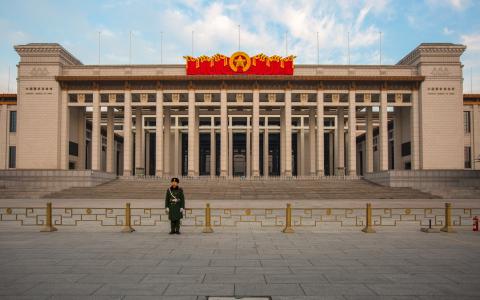
(Bloomberg) - China invoked the US’s brinkmanship over its own debt limit as it hit back at Treasury Secretary Janet Yellen’s criticism of Beijing’s handling of debt issues in developing countries.
The criticism came from the Chinese embassy in Lusaka, Zambia, on Monday, which blasted the US over its “catastrophic debt problem” and accused it of “sabotaging” other nations’ efforts to resolve debt problems.
Noting that the Treasury has begun taking extraordinary measures to meet its obligations after the US government reached its borrowing limit, the embassy said “the biggest contribution that the US can make to the debt issues outside the country is to act on responsible monetary policies, cope with its own debt problem, and stop sabotaging other sovereign countries’ active efforts to solve their debt issues.”
The sharp words contrast with a recent easing in tensions between China and the US, which kicked off in November after the countries’ two leaders met for the first time face to face in years. They also follow talks last week between Yellen and her counterpart, Liu He, which both sides said were constructive and positive.
The Treasury’s measures give it space for some months before it runs out of cash. Economists and bond-market analysts anticipate the ceiling will have to be raised sometime in the third quarter to avert a US payments default, which would be economically damaging for the world’s biggest economy and the global financial system.
Republicans who control the House intend to use the debt-ceiling deadline as leverage to extract deep spending cuts from the White House and congressional Democrats. President Joe Biden’s position is that US credit is too important to haggle over.
China holds about $870 billion in US debt, according to the latest data for November, down from more than $1.3 trillion in late 2013. China’s stockpile — the largest behind Japan’s — fell for the third straight month, reaching the lowest level since June 2010.
China has become the world’s biggest creditor to developing countries, some of which are facing a mounting debt crisis. The Group of 20 nations has set up a so-called Common Framework that brings the Paris Club of traditional rich debtor countries together with China to try to restructure the debts of low-income countries on a case-by-case basis.
Debt Burden
China has come under criticism for its perceived lack of engagement in a global effort to reduce debt burdens for developing nations, with Yellen saying on multiple occasions that Beijing has become the biggest obstacle to progress.
She repeated the call on Monday in Zambia, which Africa’s first pandemic-era sovereign defaulter in 2020, and since then has been struggling to revamp external debt that topped $17 billion, more than a third of which is held by Chinese creditors.
“Assuming Secretary Yellen’s statements about debt were correct, the best prospect of the debt issues outside the US would be the US Treasury Department solving the US’ own domestic debt problem, given how well she knows about facts, her professional capacities and her team’s implementation ability,” the Chinese embassy in Lusaka said.
For the US, its trickiest debt-ceiling showdown came in 2011, when S&P Global Ratings was alarmed enough to cut the sovereign US rating from AAA. The move roiled markets and ended up damaging consumer confidence, hurting the economic recovery from the credit crisis.
Back then, state-owned Chinese news agency Xinhua criticized US handling of the debt situation, calling the political brinkmanship in Washington “dangerously irresponsible.”
The rare harsh criticism directed at Yellen this week cast a shadow on hopes China may be pivoting away from its so-called Wolf Warrior approach raised by the transfer of a senior diplomat closely associated with the Foreign Ministry’s more confrontational shift in recent years.
By Taonga Clifford Mitimingi and Jacob Gu
With assistance from Christopher Anstey



